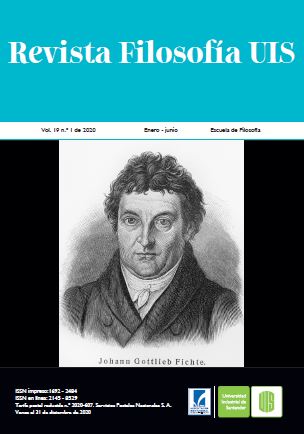The Apologies, The Clouds and the Trial of Socrates: Identity and Change in Viable Systems
Published 2020-01-01
Keywords
- Socrates,
- Plato,
- Xenophon,
- Aristophane,
- Viable System Model.
How to Cite
Copyright (c) 2020 Revista Filosofía UIS

This work is licensed under a Creative Commons Attribution 4.0 International License.
Abstract
This text examines the trial of Socrates based upon three primary sources (the Apologies of Plato and Xenophon, and Aristophane’s Clouds) and from the perspective of Stafford Beer’s Viable System Model, which proposes a set of subsystems that are necessary for any viable system. The idea is to determine if Socrates is a foreign body, hostile to Athens, or rather, a necessary subsystem. What is at stake is the need Xenophon’s Socrates of philosophical thought for the viability of society, and the specificity of philosophy: whereas Xenophon’s Socrates is more a master of morality that operates by strengthening Athen’s social cohesion (which the Viable System Model would call “system 3”, the autopoietic reproduction of the system), Plato’s Socrates questions the gnoseological bases of the principles upon which his interlocutors act, calling into question their identity and axiological orientation. This activity, from the point of view of the Viable System Model, is part of the necessary work a system must undertake, of creatively re-thinking its own identity as it undergoes change. Whereas Xenophon defends Socrates by claiming that he is a part of system 3 (which anyone would agree is a necessary part of society), Plato’s task is to defend system 5 as such, that is, the role of philosophy in society.
Downloads
References
Aristóteles (2014). Ética a Nicómaco. (J. L. Calvo Martínez, trad.). Madrid: Alianza.
Beer, S. (1995). Brain of the Firm. New York: John Wiley & Sons.
Beer, S. (2008). Heart of the Enterprise. Munich: MCB.
Bula, G. & Garavito, M. (2013). Innerarity and Immunology: Difference and Identity in selves, bodies and communities. Journal of Arts and Humanities, 2(2), 9-16.
Dean, A. (26 de septiembre de 2015). Japan's humanities chop sends shivers down academic spines. The Guardian. Recuperado de http://www.theguardian.com/higher-education-network/2015/sep/25/japans-humanities-chop-sends-shivers-down-academic-spines
Frederickson, B. (2004). The broaden-and-build theory of positive emotions. Philosophical Transactions of the Royal Society Biological Sciences, 1449(359), 1367-1377.
Han, B. (2017). La expulsión de lo distinto. Barcelona: Herder.
Jenofonte (2009). Apología. Banquete. Recuerdos de Sócrates. (J. A. Caballero López, trad.). Madrid: Alianza.
López de Hernández, N. (1991). Democracia Antigua. Revista de Historia Universal, 4, 25-50.
Lyotard, J. (1994). ¿Por qué filosofar? Barcelona: Paidós.
Mulgan, G. (2006). Good and Bad Power. New York: Penguin.
Neumann, H. (1969). Socrates in Plato and Aristophanes: In Memory of Ludwig Edelstein (1902-1965). The American Journal of Philology, 90(2), 201-214.
Platón (2006). Diálogos. (J. Calonge, trad.). Madrid: Gredos.
Ramis, J. (2005). Reflexiones sobre trasfondo político en el juicio contra Sócrates. Atenea, 491(I), 57-69.
Russell, P. (1995). The Global Brain Awakens. Palo Alto: Global Brain.
Varela, F. (2000). El fenómeno de la vida. Santiago de Chile: Dolmen.
Vlastos, G. (1992). Socrates: Ironist and Moral Philosopher. Cambridge: Cambridge University Press.

